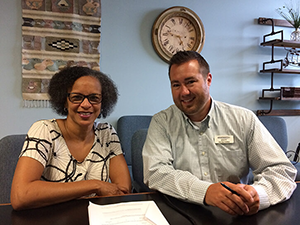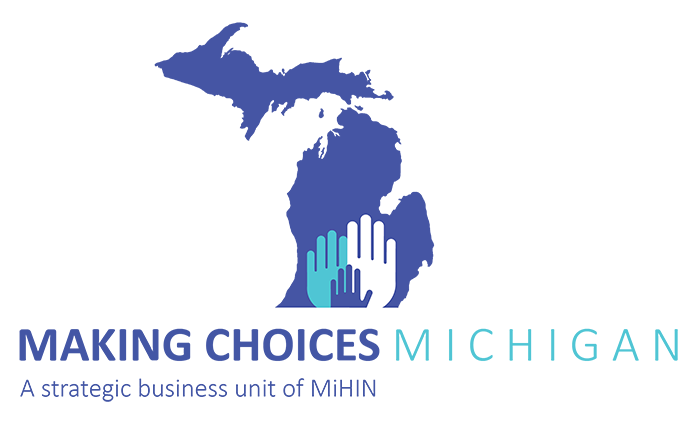Living Well
No one can predict when a sudden illness or injury may happen. Be prepared by building the foundation for your plan so you can advocate for your personal healthcare decisions.
Myth:
“Only the elderly and the sick need to think about future healthcare preferences”
Accidental injuries and illness can happen to anyone, regardless of age. Everyone 18+ should make their healthcare preferences known in case you are in a situation where you are injured or ill and can’t speak for yourself.

Discussing your goals and preferences with your family and patient advocates and, documenting those wishes in a plan, ensures that your wishes are known, thus relieving the burden on others who may have to make difficult decisions on your behalf.
What ACP Means to You
Advance care planning is building the foundation for a lifetime of conversations to ensure that as your life unfolds your preferences for healthcare are known. The culmination of these conversations is an Advance Directive, a legal document that should be shared with your family members, patient advocates, and healthcare providers.
This document can be updated and changed as needed, and should be reviewed anytime a major life change takes place.
Why You Need It
Adults who are well, even if managing a chronic illness, should proactively discuss, decide, and document their preferences for future healthcare.
No one can predict when you may become unable to make personal healthcare decisions. When you cannot speak for yourself, the health system’s default is to provide every treatment available to extend life.
Clearly communicating your preferences, values, and beliefs to your patient advocate, family, and broader healthcare system ensures that your preferences are known and can be honored.
Resources
Death Over Dinner >
WGVU Special: Advance Care Planning >
I’m Young And Healthy: Why Do I Need An Advance Health Care Directive? >
Atul Gawande – Being Mortal >
The Conversation Project >
Talk of a Lifetime
Living Well with Illness
Managing a serious illness is complex. We’ll guide you through discussing your goals and preferences with your family, patient advocates, and healthcare providers.
Myth:
“My healthcare provider will bring up advance care planning when it’s time.”
Not every healthcare provider is knowledgeable or comfortable talking with patients about advance care planning. Sometimes, there is simply not enough time during an office visit to have the in-depth conversation about your goals that you deserve. Discussing, deciding, and documenting what a good life looks like for you before attending your next appointment prepares you to talk further with your provider about what treatments are in alignment with your goals.
What ACP Means to You
Advance care planning for adults managing serious illness is an ongoing dialogue between you, your patient advocates, and your healthcare providers.
The culmination of these conversations is an Advance Directive, a legal document that should be shared with your family members, patient advocates, and healthcare providers. This document can set the stage for your doctor to write physician’s orders to ensure that your wishes must be followed by other healthcare providers.
Why You Need It
Advance care planning helps prepare you for ongoing conversations with your healthcare providers.
When you’ve taken the time to identify what a good life looks like for you, you are more prepared and confident in communicating those goals to your healthcare provider, and they are better equipped to work with you to determine which treatments will honor your wishes.
Identifying a patient advocate to speak on your behalf ensures that your wishes will be known and communicated to your healthcare provider should you lose the ability to speak for yourself.
Resources
Atul Gawande – Being Mortal >
WGVU Special: Advance Care Planning >
The Conversation Project >
Living Well to the End
Have peace of mind knowing that your goals and preferences, including end of life decisions, are documented and available to your family, patient advocates, and healthcare providers.
Myth:
“My family will know what I want”
Unless you have had specific discussions with your family about end of life care, they may not actually know what you want.
Even when you have discussed your wishes with them, unless you have a document outlining those wishes, your family and patient advocates may still be unsure of what decisions to make on your behalf. Family members may not agree on what you would want, resulting in family disputes that can damage relationships and add chaos and uncertainty to an already stressful situation.
What ACP Means to You
Advance care planning for adults preparing for end of life is an opportunity to discuss, decide, and document what a good life looks like for you.
When you’ve taken the time to identify your goals and preferences for healthcare, including end of life decisions, you are more prepared and confident in communicating those goals to your healthcare provider, and they are better equipped to work with you to determine which types of care will honor your wishes.
Why You Need It
When you cannot speak for yourself, the health system’s default is to provide every treatment available to extend life, no matter the situation.
Advance care planning for adults preparing for end of life is an important tool to ensure that you, your patient advocates, and your healthcare providers are on the same page when it comes to your end of life care. Documenting your wishes in an Advance Directive can help set the stage for your doctor to write specific orders to ensure that your wishes must be followed by other healthcare providers as well.
Resources
WGVU Special: Advance Care Planning >
Choosing a Hospice Provider >
Atul Gawande – Videos >
READY TO TALK ABOUT IT?
We believe that every person should be empowered to advocate for their personal health by identifying their healthcare preferences and having these preferences honored by their healthcare provider. We can help create your personal roadmap to plan for future healthcare decisions. It all starts with a conversation. Let’s Talk
Other MCM Pages
MCM Home | About | Resources | Life Stages | Let’s Talk | Volunteer | ACP CoP
*If you’re experiencing issues with links or buttons not working, refresh the page or try a different browser.

